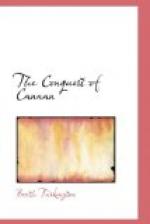They kept the air whirring with their noise. The news of that sitting which had caused the Squire, Flitcroft, and Peter Bradbury to risk the Court’s displeasure, was greeted outside with loud and vehement disfavor; and when, at noon, the jurymen were marshalled out to cross the yard to the “National House” for dinner, a large crowd followed and surrounded them, until they reached the doors of the hotel. “Don’t let Lawyer Louden bamboozle you!” “Hang him!” “Tar and feathers fer ye ef ye don’t hang him!” These were the mildest threats, and Joe Louden, watching from an upper window of the Court-house, observed with a troubled eye how certain of the jury shrank from the pressure of the throng, how the cheeks of others showed sudden pallor. Sometimes “public sentiment” has done evil things to those who have not shared it; and Joe knew how rare a thing is a jury which dares to stand square against a town like Canaan aroused.
The end of that afternoon’s session saw another point marked for the defence; Joe had put the defendant on the stand, and the little man had proved an excellent witness. During his life he had been many things—many things disreputable; high standards were not brightly illumined for him in the beginning of the night-march which his life had been. He had been a tramp, afterward a petty gambler; but his great motive had finally come to be the intention to do what Joe told him to do: that, and to keep Claudine as straight as he could. In a measure, these were the two things that had brought him to the pass in which he now stood, his loyalty to Joe and his resentment of whatever tampered with Claudine’s straightness. He was submissive to the consequences: he was still loyal. And now Joe asked him to tell “just what happened,” and Happy obeyed with crystal clearness. Throughout the long, tricky cross-examination he continued to tell “just what happened” with a plaintive truthfulness not to be imitated, and throughout it Joe guarded him from pitfalls (for lawyers in their search after truth are compelled by the exigencies of their profession to make pitfalls even for the honest), and gave him, by various devices, time to remember, though not to think, and made the words “come right” in his mouth. So that before the sitting was over, a disquieting rumor ran through the waiting crowd in the corridors, across the Square, and over the town, that the case was surely going “Louden’s way.” This was also the opinion of a looker-on in Canaan—a ferret-faced counsellor of corporations who, called to consultation with the eminent Buckalew (nephew of the Squire), had afterward spent an hour in his company at the trial. “It’s going that young fellow Louden’s way,” said the stranger. “You say he’s a shyster, but—”
“Well,” admitted Buckalew, with some reluctance, “I don’t mean that exactly. I’ve got an old uncle who seems lately to think he’s a great man.”
“I’ll take your uncle’s word for it,” returned the other, smiling. “I think he’ll go pretty far.”




